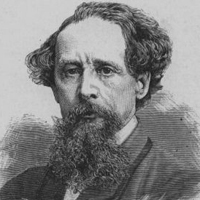Dickens's Hard Times as a Social Novel
Hard Times by Charles Dickens is set in the Victorian age predominantly attacking on the then existing social problems, educational system, caste system, economic system and many more. The Victorian era was dominated by an aristocratic group of people whose power later slowly faded away and lost its influence.

Charles Dickens
The condition of fading aristocracy has been represented through the characters, Mr. Gradgrind and Bounderby in the novel.
Dickens clearly states his hatred towards the divorce law which remains a privilege of the rich people. Stephen Blackpool, a ‘hand’ in an industry had a drunk and brutish wife, wanted a divorce from her, but can’t because of his poor financial condition and was not able to afford the costly fee of divorce law. The oppression of poor working class by the rich industrialist is the main point of indignation in the novel. The hard workers are just termed as “Hands” without any emotions, which shows that they are counted only in terms of work, production and manufacturing. Except that they are not human beings. The novel is a radical criticism against the economic disparity of the age where the rich are extremely rich and the poor have abject poverty, they can’t even have a square meal. All the system is against the blue collar workers. The ‘Hands’ were always suppressed by law, trade union and their employers.
The workers in the industries are underpaid and do not receive ample and decent facilities to run life, who ultimately go to the protest against industrialists. Dickens exposed his anger towards the developing system of industrialism in England.
The novel is a great example of “attack on the utilitarian’ of the Victorian era, where emotions and sentiments were not counted but only the working efficiency, facts, number and calculations were given more importance. The facts have replaced the love and sentiments. For Gradgrind “Love is misplaced expressions”. The Victorian era was marked with the same features. This situation has been distinctly shown by Dickens. The children of Grandgrind were not given permission to wander, to imagine, to ask questions related to emotions and even they were not told any stories and were not made hear any rhymes. For, Gradgrind the fact is all and everything. He even converts the relations into numbers and facts and convinces his daughter Louisa to get married to a man double of her age.
The educational system too was satirized by Dickens in the novel. The curriculum, the school environment and teachers were deeply, influenced by the utilitarian values. The students were taught to follow what the teachers told, but not to think or wonder upon the teaching given by them. For instance, Tom faced a problem and he was not able to deal with the situation, though he was highly educated at that time and Louisa can’t understand her own emotions because of the poor education system of the Victorian era.
Reading on Hard Times
Characterization in Hard Times
Irony and Satire in Hard Times
Characterization of Mr. Gradgrind
Victorian Society in Hard Times
Industrial Ugliness and Capitalistic Greed in Hard Times
 |
bachelorandmaster.com |